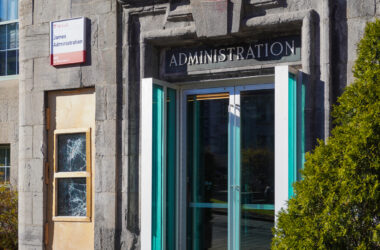On Jan. 28, during a Students’ Society of McGill University’s (SSMU) Legislative Council meeting, councillors heard a presentation from an organizer of the Immigrant Workers Centre (IWC) about the poor labour conditions that some Dollarama warehouse employees face. Following this presentation, the Legislative Council voted unanimously to approve a motion mandating that SSMU’s Office of External Affairs support student solidarity with Dollarama warehouse workers. The Tribune examines the significance of this motion.
How do Temporary Agencies abuse workers’ rights?
Since 2009, the IWC has concentrated its efforts on supporting temporary agency workers such as those working in Dollarama warehouses. Temporary workers tend to lack a platform from which to advocate for labour rights due to the intervention of staffing or “temp” agencies between workers and their employers.
The use of staffing agencies by large multinational companies such as Amazon and Dollarama has become increasingly common over the past decade. Workers employed by staffing agencies are often racialized undocumented immigrants who, due to their position as contractors rather than employees, are denied many forms of labour rights.
What are the working conditions at Dollarama warehouses?
Dollarama has a total of over 1,600 stores across Canada and Central America and employs 20,000 workers directly. Within their distribution centers, however, over 1,000 workers—most of whom are racialized immigrants—are employed by staffing agencies.
According to the IWC, warehouse workers employed by staffing agencies are commonly paid an hourly wage of $12-15. At 40 hours a week for $15 an hour, workers earn an annual salary of just over $31,000, which falls well below Canada’s official poverty line for a family of three. Furthermore, the IWC reports that 10 per cent of warehouse workers are paid under the minimum wage.
In addition to low pay, the IWC states that workers employed at Dollarama’s distribution centers face gruelling working conditions. It is reported that workers are expected to move boxes weighing 50 pounds every 20 seconds to reach their shift quota. Furthermore, 15-minute lunch breaks are often reduced to five minutes as it takes workers several minutes to walk across the warehouse from their workstation to break rooms.
What are McGill’s Investments in Dollarama?
As is shown in McGill’s 2020 report on the university’s publicly traded Canadian equities above $500,000, McGill University has $3,051,682 invested in the Montreal-based dollar store retail chain Dollarama. While McGill’s holdings in the chain are not the most significant portion of the school’s many equities, the more than three-million–dollar investment makes Dollarama the 16th most valuable in McGill’s 2020 Canadian equities portfolio. According to McGill’s Statement of Investment Policy, the goal of the McGill Investment Pool is to preserve its capital while remaining within the social and ethical standards of the university.
The monetary connection between McGill and Dollarama goes further: The Rossy Family, whose donations enabled the completion of McGill’s $14 million Rossy Wellness Hub, are the founders and the CEO of Dollarama Inc. with a reported net value of $2.52 billion.
What will SSMU’s Office of External Affairs do?
By approving this motion, SSMU has stated that it will mandate its External Affairs office’s campaigns department to support student campaigns in solidarity with Dollarama employees. According to the motion, this may involve submitting petitions to McGill University’s Committee to Advise on Matters of Social Responsibility (CAMSR), a committee within the McGill Board of Governors responsible for advising the Board on issues of social responsibility within its investment portfolio. Furthermore, SSMU will be allocating resources for events attempting to raise awareness about this issue.









